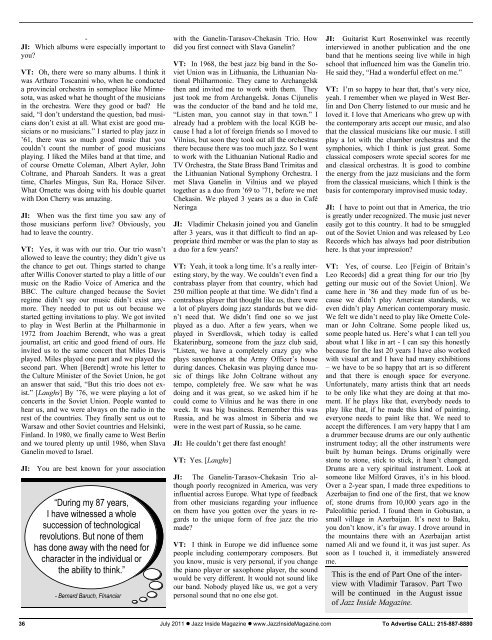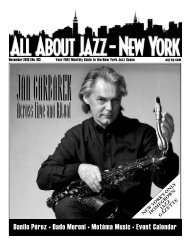Piano Lovers' Celebration Interviews SUMMER ... - Jazz Singers.com
Piano Lovers' Celebration Interviews SUMMER ... - Jazz Singers.com
Piano Lovers' Celebration Interviews SUMMER ... - Jazz Singers.com
Create successful ePaper yourself
Turn your PDF publications into a flip-book with our unique Google optimized e-Paper software.
-<br />
JI: Which albums were especially important to<br />
you?<br />
VT: Oh, there were so many albums. I think it<br />
was Arthuro Toscanini who, when he conducted<br />
a provincial orchestra in someplace like Minnesota,<br />
was asked what he thought of the musicians<br />
in the orchestra. Were they good or bad? He<br />
said, “I don’t understand the question, bad musicians<br />
don’t exist at all. What exist are good musicians<br />
or no musicians.” I started to play jazz in<br />
’61, there was so much good music that you<br />
couldn’t count the number of good musicians<br />
playing. I liked the Miles band at that time, and<br />
of course Ornette Coleman, Albert Ayler, John<br />
Coltrane, and Pharoah Sanders. It was a great<br />
time, Charles Mingus, Sun Ra, Horace Silver.<br />
What Ornette was doing with his double quartet<br />
with Don Cherry was amazing.<br />
JI: When was the first time you saw any of<br />
those musicians perform live? Obviously, you<br />
had to leave the country.<br />
VT: Yes, it was with our trio. Our trio wasn’t<br />
allowed to leave the country; they didn’t give us<br />
the chance to get out. Things started to change<br />
after Willis Conover started to play a little of our<br />
music on the Radio Voice of America and the<br />
BBC. The culture changed because the Soviet<br />
regime didn’t say our music didn’t exist anymore.<br />
They needed to put us out because we<br />
started getting invitations to play. We got invited<br />
to play in West Berlin at the Philharmonie in<br />
1972 from Joachim Berendt, who was a great<br />
journalist, art critic and good friend of ours. He<br />
invited us to the same concert that Miles Davis<br />
played. Miles played one part and we played the<br />
second part. When [Berendt] wrote his letter to<br />
the Culture Minister of the Soviet Union, he got<br />
an answer that said, “But this trio does not exist.”<br />
[Laughs] By ’76, we were playing a lot of<br />
concerts in the Soviet Union. People wanted to<br />
hear us, and we were always on the radio in the<br />
rest of the countries. They finally sent us out to<br />
Warsaw and other Soviet countries and Helsinki,<br />
Finland. In 1980, we finally came to West Berlin<br />
and we toured plenty up until 1986, when Slava<br />
Ganelin moved to Israel.<br />
JI: You are best known for your association<br />
“During my 87 years,<br />
I have witnessed a whole<br />
succession of technological<br />
revolutions. But none of them<br />
has done away with the need for<br />
character in the individual or<br />
the ability to think.”<br />
- Bernard Baruch, FInancier<br />
with the Ganelin-Tarasov-Chekasin Trio. How<br />
did you first connect with Slava Ganelin?<br />
VT: In 1968, the best jazz big band in the Soviet<br />
Union was in Lithuania, the Lithuanian National<br />
Philharmonic. They came to Archangelsk<br />
then and invited me to work with them. They<br />
just took me from Archangelsk. Jonas Cijunelis<br />
was the conductor of the band and he told me,<br />
“Listen man, you cannot stay in that town.” I<br />
already had a problem with the local KGB because<br />
I had a lot of foreign friends so I moved to<br />
Vilnius, but soon they took out all the orchestras<br />
there because there was too much jazz. So I went<br />
to work with the Lithuanian National Radio and<br />
TV Orchestra, the State Brass Band Trimitas and<br />
the Lithuanian National Symphony Orchestra. I<br />
met Slava Ganelin in Vilnius and we played<br />
together as a duo from ’69 to ’71, before we met<br />
Chekasin. We played 3 years as a duo in Café<br />
Neringa<br />
JI: Vladimir Chekasin joined you and Ganelin<br />
after 3 years, was it that difficult to find an appropriate<br />
third member or was the plan to stay as<br />
a duo for a few years?<br />
VT: Yeah, it took a long time. It’s a really interesting<br />
story, by the way. We couldn’t even find a<br />
contrabass player from that country, which had<br />
250 million people at that time. We didn’t find a<br />
contrabass player that thought like us, there were<br />
a lot of players doing jazz standards but we didn’t<br />
need that. We didn’t find one so we just<br />
played as a duo. After a few years, when we<br />
played in Sverdlovsk, which today is called<br />
Ekaterinburg, someone from the jazz club said,<br />
“Listen, we have a <strong>com</strong>pletely crazy guy who<br />
plays saxophones at the Army Officer’s house<br />
during dances. Chekasin was playing dance music<br />
of things like John Coltrane without any<br />
tempo, <strong>com</strong>pletely free. We saw what he was<br />
doing and it was great, so we asked him if he<br />
could <strong>com</strong>e to Vilnius and he was there in one<br />
week. It was big business. Remember this was<br />
Russia, and he was almost in Siberia and we<br />
were in the west part of Russia, so he came.<br />
JI: He couldn’t get there fast enough!<br />
VT: Yes. [Laughs]<br />
JI: The Ganelin-Tarasov-Chekasin Trio although<br />
poorly recognized in America, was very<br />
influential across Europe. What type of feedback<br />
from other musicians regarding your influence<br />
on them have you gotten over the years in regards<br />
to the unique form of free jazz the trio<br />
made?<br />
VT: I think in Europe we did influence some<br />
people including contemporary <strong>com</strong>posers. But<br />
you know, music is very personal, if you change<br />
the piano player or saxophone player, the sound<br />
would be very different. It would not sound like<br />
our band. Nobody played like us, we got a very<br />
personal sound that no one else got.<br />
36 July 2011 � <strong>Jazz</strong> Inside Magazine � www.<strong>Jazz</strong>InsideMagazine.<strong>com</strong><br />
JI: Guitarist Kurt Rosenwinkel was recently<br />
interviewed in another publication and the one<br />
band that he mentions seeing live while in high<br />
school that influenced him was the Ganelin trio.<br />
He said they, “Had a wonderful effect on me.”<br />
VT: I’m so happy to hear that, that’s very nice,<br />
yeah. I remember when we played in West Berlin<br />
and Don Cherry listened to our music and he<br />
loved it. I love that Americans who grew up with<br />
the contemporary arts accept our music, and also<br />
that the classical musicians like our music. I still<br />
play a lot with the chamber orchestras and the<br />
symphonies, which I think is just great. Some<br />
classical <strong>com</strong>posers wrote special scores for me<br />
and classical orchestras. It is good to <strong>com</strong>bine<br />
the energy from the jazz musicians and the form<br />
from the classical musicians, which I think is the<br />
basis for contemporary improvised music today.<br />
JI: I have to point out that in America, the trio<br />
is greatly under recognized. The music just never<br />
easily got to this country. It had to be smuggled<br />
out of the Soviet Union and was released by Leo<br />
Records which has always had poor distribution<br />
here. Is that your impression?<br />
VT: Yes, of course. Leo [Feigin of Britain’s<br />
Leo Records] did a great thing for our trio [by<br />
getting our music out of the Soviet Union]. We<br />
came here in ’86 and they made fun of us because<br />
we didn’t play American standards, we<br />
even didn’t play American contemporary music.<br />
We felt we didn’t need to play like Ornette Coleman<br />
or John Coltrane. Some people liked us,<br />
some people hated us. Here’s what I can tell you<br />
about what I like in art - I can say this honestly<br />
because for the last 20 years I have also worked<br />
with visual art and I have had many exhibitions<br />
– we have to be so happy that art is so different<br />
and that there is enough space for everyone.<br />
Unfortunately, many artists think that art needs<br />
to be only like what they are doing at that moment.<br />
If he plays like that, everybody needs to<br />
play like that, if he made this kind of painting,<br />
everyone needs to paint like that. We need to<br />
accept the differences. I am very happy that I am<br />
a drummer because drums are our only authentic<br />
instrument today; all the other instruments were<br />
built by human beings. Drums originally were<br />
stone to stone, stick to stick, it hasn’t changed.<br />
Drums are a very spiritual instrument. Look at<br />
someone like Milford Graves, it’s in his blood.<br />
Over a 2-year span, I made three expeditions to<br />
Azerbaijan to find one of the first, that we know<br />
of, stone drums from 10,000 years ago in the<br />
Paleolithic period. I found them in Gobustan, a<br />
small village in Azerbaijan. It’s next to Baku,<br />
you don’t know, it’s far away. I drove around in<br />
the mountains there with an Azerbaijan artist<br />
named Ali and we found it, it was just super. As<br />
soon as I touched it, it immediately answered<br />
me.<br />
This is the end of Part One of the interview<br />
with Vladimir Tarasov. Part Two<br />
will be continued in the August issue<br />
of <strong>Jazz</strong> Inside Magazine.<br />
To Advertise CALL: 215-887-8880




